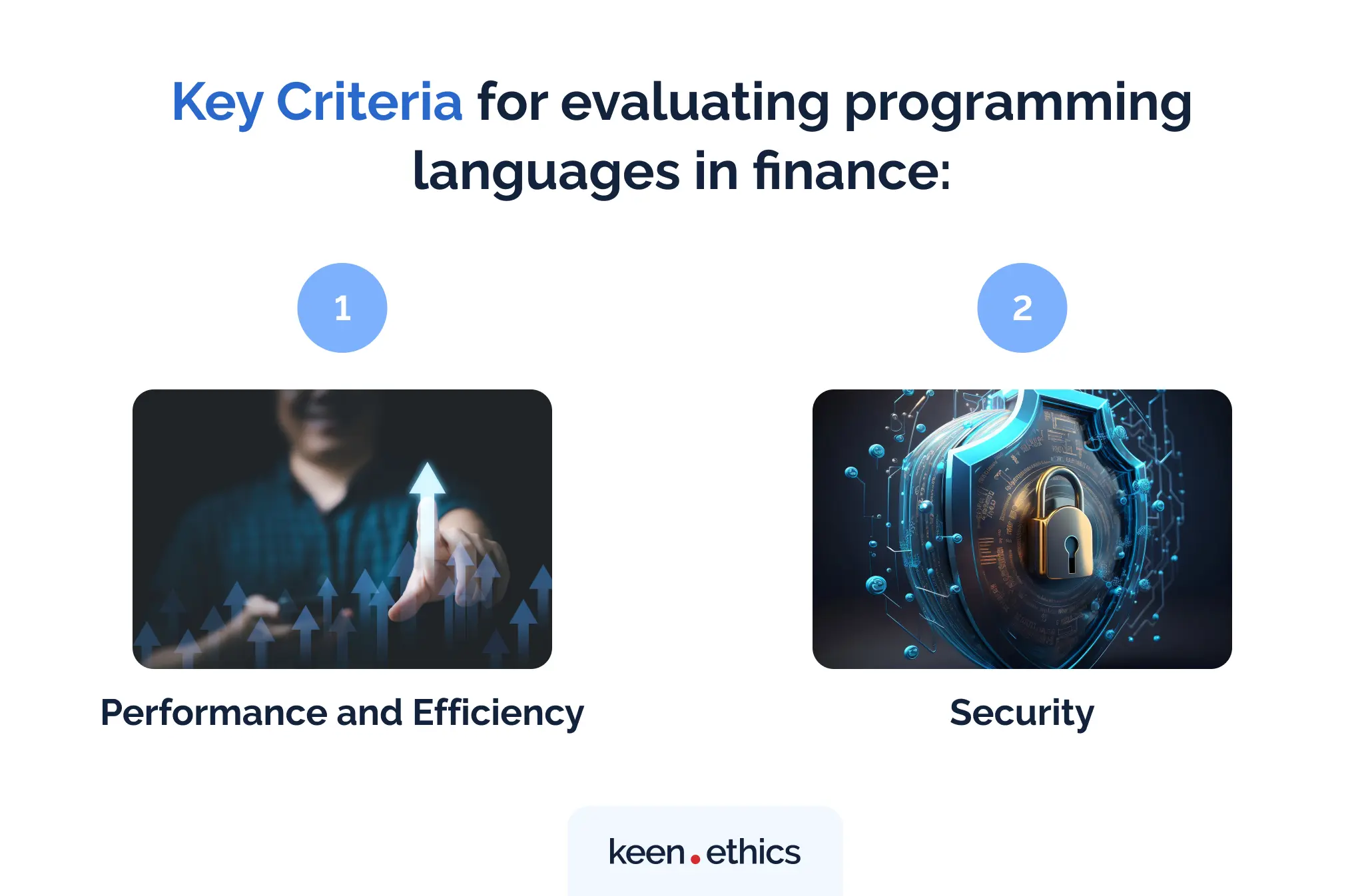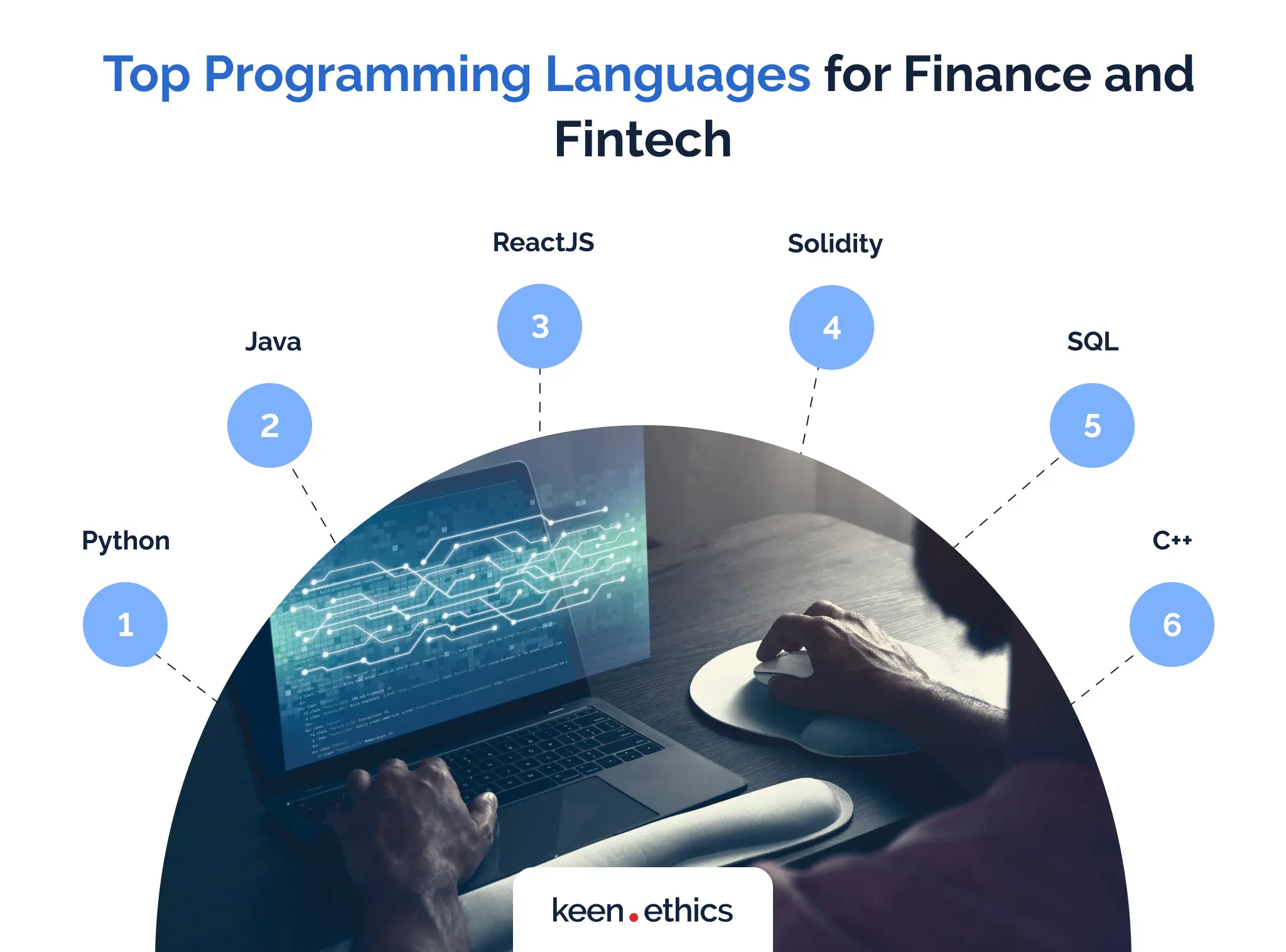Financial organizations are progressively investing in financial software, seeking to engage in proper risk management. In many ways, the demands for finance programming languages are much stricter than what the average market expects. The banking industry works with the most sensitive information one can imagine, financial data. A leak of data about the user’s finances may easily end up in personal damage (for instance, direct targeting by some criminals). For this reason, only a small subset of technologies is suitable for the needs of finance businesses. The core goal of the presented article is to discuss how to choose the right framework for your financial technology app. We’ll outline some core demands and then transition to the analysis of particular languages.
Key Criteria for Evaluating Programming Languages in Finance

Let’s first discuss what criteria you should consider for your coding system. In this respect, our analysis touches upon two essential aspects:
Performance and Efficiency
Above all, you should consider an investment in high performance and efficiency. Slow software can make banking decisions difficult and uncomfortable. If you need to do dozens of transactions a day, a slow interface would definitely lead to issues with market adoption.
1. Speed and processing capabilities
The first thing we recommend focusing on in the financial services industry is speed and processing capabilities. We believe that the faster your app can process transactions, the higher its popularity will be. Many traditional banks are universally disliked for being unable to provide good performance in their banking and payment systems. Software, right now, is essentially the face of a company. Hence, a slow app can signify that your entire bank platform is low-quality. Even if your business model doesn’t rely that much on online transactions, having a fast app is essential to guarantee the loyalty of the newcomers. This is especially important for the younger generations, which are overwhelmingly relying on software in everyday life.
2. Memory management
Another major component to consider in financial software development is memory management. It’s not enough for an app to be fast. Why? The definition of fast very much depends on the hardware people are using. Usually, when we talk about fast, we mean performance on average machines on the market. However, many people have below-average smartphones.
As a result, technology can easily limit the ability of some people to use a banking application. In this respect, the best way to overcome this problem is to focus on proper memory management. If you conserve RAM properly, you’ll be able to cover a much larger number of smartphones than other companies. This also touches upon heavier software. A lightweight app will be able to work on a server for a longer time than a more heavyweight one. On average, requirements for software developers tend to grow with app evolution: if you start from a lower base, they won’t grow as fast.
Security
While performance is vital for public perception, security is an essential component of a proper reputation.
1. Importance of secure coding in financial apps
As we’ve mentioned before, banking involves one of the most vulnerable aspects of human life. This aspect is finance, the result of human labor. If a person sustains damage to their life savings, the outcomes can be genuinely devastating. For example, they may be later unable to get proper education or healthcare. Consequently, an insecure app is a dangerous pitfall for a developer. It’s better to compromise on some features or engage in more complex development process, but have an app that is easy to defend against outside threats through a robust security feature.
2. Programming languages with strong security features
There are multiple programming languages with strong security features on the market. In this respect, it’s reasonable to split them into two types: adapting languages and design-centric languages. What do we mean by this? On the one hand, we see languages that have become strong in security due to constantly battling various threats. These languages are usually older and are extremely popular among coders. On the other hand, languages that focus on making secure foundations from the get-go also exist. They’re stronger at security in theory, but can have major problems because of being less popular.
The first group contains languages such as Python and JavaScript. They define the modern web development services and mobile application development: as a result, the number of complex threats they encounter is tremendous due to hacker attention. As for the second group, it consists of the less popular but more specialized languages like Go, Rust, and Elixir. In our opinion, the best choice is to combine those languages. In this way, you’ll be able to create a balance between their core issues and the positives that inevitably appear due to technology paradigms.
Top Programming Languages for Finance and Fintech

In this section, we want to review the top programming languages for finance and fintech industry. Let’s analyze every core tool available in this sector.
Python
The first language to consider for finance is Python. In our opinion, you should focus on the following positives of the technology while choosing it for your financial applications:
1) Easy-to-maintain code: Python has a very user-friendly code syntax if compared to other products on the market. It’s genuinely easy even for non-developers to be able to read Python code. This is vital for any financial project because such readability prevents you from being stuck with one development team. In this light, banks receive a core positive: they get an opportunity to be flexible with their projects. Readability also bridges the finance expertise gap. Many coding developers can have serious misconceptions about finance: the simplicity of input from finance professionals helps minimize this problem.
2) Many finance-friendly modules: Python has been in development for many years, gaining major popularity among scientists. Thus, it has many great mathematical modules, such as NumPy and pandas. This is essential if you want to build strong analytical tools for your app. For example, NumPy makes Python one of the best programming languages for finance since it enables complex calculations using some of the most advanced tools available to mathematicians. Ultimately, all those elements enable Python to be outstanding in terms of visualization. Multiple financial apps are using this aspect of the language as a solution for their core analytical challenges.
3) Strong AI support: In many ways, modern progress in any sector greatly relies on the ability of the core companies to create advanced solutions using AI. Python is a remarkable tool in this regard. There are multiple strong libraries aimed at AI for Python. Consequently, if you’re willing to develop AI for fintech solutions, Python is your friend for one simple reason: you won’t have to reinvent the wheel while creating some central tools for your AI framework.
4) Open-source development: Python is among the core achievements of the open-source community. This language doesn’t require you to subscribe to the changes made by any company. Instead, it’s completely free and, as a result, one of the best choices financially concerning programming languages. The open-source nature is also essential for security. You have an opportunity to fully review the Python codebase and ensure that it doesn’t introduce any significant problems to your app.
Examples of Python apps in fintech
Multiple major apps in the fintech market are actively using Python right now. Firstly, Python is being used for Revolut, one of the world’s most popular neobanks. Secondly, it’s behind platforms like Robinhood, which are currently changing the way we manage cryptocurrencies. Lastly, platforms for analytics such as Kensho are benefitting from the strong mathematical modules of Python. Obviously, the list isn’t exhaustive. As you can see, Python is a tried-and-tested technology in the fintech market.
Java
Java is also a top-ranked finance coding language. The reasons for this choice are rational, in our opinion. Here are some core aspects to consider in this respect:
1) Multiplatform development. Java has a strong framework of “write once, run everywhere.” Any device that supports Java Virtual Machine has the capability to run Java apps. This means you don’t have to create separate teams for different versions of your app. Instead, you can write a singular codebase for all aspects of your fintech app and then adapt the interface to different platforms using front end development tools such as React.js.
2) High security. Java is notable for major investments in security made by its developers, lowering operational risk. Oracle, in one way or another, constantly monitors threats and creates new solutions to those problems. Yes, Java is highly popular and, as a result, many types of malware exist for it. However, at the same time, we should note that it’s also at the forefront of app security because it has an opportunity to adapt to the largest threats on the market. The fact that a commercial organization develops it is especially important. A dedicated team is likely to create major security changes faster than the open-source developers.
3) Good multithreading capabilities. Java is notable for being a language with good multithreading support. Consequently, it’s great at scaling various apps and adapting to diverging program requirements. Many financial solutions need to expand their scale on a constant basis due to rising popularity. Java enables such expansion by offering several tools for managing multithreading properly.
4) Ecosystem maturity. Java has been on the market since 1995. Thus, this language went through one of the largest cycles of development. It has modules for almost every task imaginable. More importantly, its development proved to be highly directed because it was managed by a proprietary company, Oracle. In this light, Java is undoubtedly among the best platforms from the standpoint of enterprise development. Essentially, it was developed as a finance programming language from the onset.
Java’s role in developing enterprise-level financial apps
Java is currently used by multiple large-scale banks during the development of high-quality solutions for their internal activities. In this regard, we can note the following companies:
- JP Morgan Chase;
- Fidelity Investments;
- PayPal;
- Charles Schwab;
- Citigroup
Those companies are using Java for developing trading platforms or security modules for enhancing the user experience. Therefore, Java is, essentially, a backbone for the majority of the underlying infrastructure in modern finance. Its ability to fit both mobile and desktop platforms makes it extremely popular for creating apps aimed at internal usage centered around various finance professionals.
C++

C++ is a low-level compiled language that has a strong emphasis on potent memory control. Hence, it’s among the best options for CPU-intensive tasks. It’s easy to optimize C++ to the needs of specific devices. You can compile your apps in a way that will squeeze everything out of the machines you have in your possession.
What’s the downside, then? Why not develop everything in C++? The language is also among the most difficult on the market, creating potential risks due to mismanagement. Developing in it isn’t an easy task and, consequently, it’s usually used for the most demanding goals. In this respect, these are aims that require extreme processing speed, such as high-frequency trading. Modern finance markets are volatile and change every second. Even the smallest political or industrial transformation can modify the financial outlook for millions of people. Thus, there’s a need for platforms that fully reflect this changing speed of decision-making.
C++ is the king of algorithmic trading systems. It’s being used on many platforms, such as MetaTrader 5. Algorithmic trading systems track the market and automatically purchase certain stocks according to a preset program. In a situation where trading is high speed, this is the only solution that can offer long-term positive results for the tasks performed by finance managers.
Solidity (for blockchain and smart contracts)
Blockchain application is among the core innovations in modern finance. In one way or another, it’ll become the de facto standard of the finance sector in the upcoming years. Why? It’s one of the best database tools aimed at the transparent and efficient storing of financial data. Blockchain has two main features:
1) It’s transparent: anyone can review blockchain information; as a result, no transactions are hidden in this network. This is a perfect data tool for combatting problems such as corruption. Why? In a system where everyone’s transactions are anonymous but visible, it’ll be difficult to hide transactions that clearly stem from illegal sources.
2) It’s immutable: one of the ways in which corruption occurs is the mutability of data. For example, some finance industry specialists can try to transform certain variables in transactions. Despite the illegality, such fraud is extremely popular and is common in the modern finance world. The blockchain resolves this issue by creating platforms that are immutable in terms of data. This means there’s no way to change information about a certain transaction. Thus, the approach promotes a much better treatment for various corruption issues than other methodologies. If you want to create databases that are reliable, then blockchain may be the best solution for you.
Smart contracts are a new approach to creating contracts that use the core advantages of blockchain platforms. In this regard, smart contracts automate and integrate agreements between various parties into the blockchain. Solidity is a language developed specifically to facilitate those contracts. It has all the tools necessary for creating smart contracts and integrating with the biggest cryptocurrency platforms such as Ethereum. If you want to create some form of cryptocurrency platform, don’t hesitate to use Solidity. Today, it’s essentially a must-have for creating high-quality platforms on the presented market.
SQL
A major concern for all types of financial organizations is the management of information. In this respect, the core technology to consider is SQL. SQL is a database coding language that allows one to create large collections of data on various user variables. It’s a perfect way to store the financial data concerning the core users. SQL isn’t a database in itself, but it’s used in platforms like MySQL to control the information flow.
Proper usage of coding languages such as SQL is essential for all data-driven companies. You can use the library framework of this language to then integrate it with other languages (for instance, C). What will this enable? Such an approach will enable you to not only collect information about various customer requests, but to process it in an efficient way. In this respect, we see SQL as an essential component for the so-called Big Data platforms. SQL offers you an opportunity to create analytical platforms that can review tremendous amounts of data.
ReactJS
A major component of every app developed by a fintech company is a proper interface. The ability to create a UI that is comfortable for the users is often a core element of success. What’s the problem with UI for fintech apps?
As you can see, it’s highly likely that the developers of fintech applications will have to use a tremendous number of technologies. In this regard, they may need a combination of multiple languages such as C++ and Java to create their unique tech stack. As a result, there’s a risk of promoting a disparity between various apps in terms of look and feel. Ultimately, the need for a tool that can enable the delivery of comfortable interfaces despite the language differences arises.
In this respect, the best coding language for finance from the standpoint of interface development is undoubtedly ReactJS. ReactJS is a JavaScript library aimed at creating comfortable user interfaces. Its core feature is the ability to use one codebase for adapting to multiple platforms. ReactJS uses a special syntax that allows it to load design elements from multiple platforms using the same code. Consequently, it saves time for development and allows separating the user interfaces from the internal codebase. More importantly, the platform does all this while maintaining responsive and user-friendly financial interfaces. It’s also easy for developers, making a perfect addition for teams that already need to operate multiple complex programming languages.
Considerations for Developers and Financial Professionals

Advice for developers choosing a programming language for finance
So, which programming language is best for finance? In our opinion, the one that best suits your needs. Theoretically, one can write any app in any language. In reality, you should choose different languages for different goals. As a result, our recommendation is simple: don’t focus on favorites. Choose languages based on your security and processing needs as well as your existing expertise. A good idea here is to consult other specialists. For instance, you can try to address us.
Skill development and training recommendations for financial professionals entering the tech space
Before the conclusions, we would also like to mention some skills development and training recommendations for financial professionals entering the tech space. So, here are some core skills to consider if you’re a financial professional:
- Theoretical knowledge of programming;
- Practical knowledge of programming (at least, the ability to read various pieces of code)
- Acquaintance with the core fintech programming standards;
- Good knowledge of mathematics and economics, with the ability to transform them into working models for financial analysis.
Conclusion
To summarize, you should focus on languages such as C++ and Python while developing your fintech platforms. These are some of the best options on the market for development. Java, Solidity, SQL, and ReactJS are also essential. They allow you to deal with the presentation of various fintech apps and, more importantly, their active maintenance.
In the end, we would also like to talk about the future of programming for finance. Here, we can note that we are seeing more and more languages that aim to target finance specifically. For example, Solidity exists specifically for smart contracts on the blockchain. Most likely, we’ll see more languages of this kind and more modules of various types for existing languages. The revolution will be especially potent concerning AI.
Contact us to get a consultation!

























